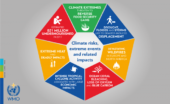Molly Minturn - My family is heartbroken to share that my father died in surgery on Monday, Feb. 10. It…
Energy and energy security 2010
Written by Diana Thebaud Nicholson // April 3, 2010 // Environment & Energy, Geopolitics, Nuclear, Public Policy, Security // Comments Off on Energy and energy security 2010
Global Energy Hub Journal of Energy Innovation and Entrepreneurship
Global Energy After the Crisis
(Foreign Affairs March/April 2010) Commercially traded energy is what classical economists used to call a “basic good”: directly or indirectly, it enters the production of every other produced commodity or service. Nonrenewable fossil-fuel energy and nuclear energy are produced by first converting and then burning natural resources. Because these resources are finite and unevenly distributed, they seem to become increasingly hard to come by when global economic activity expands. The need to maintain regular access to them is the simple logic behind the concept of energy security. Recently, these traditional concerns have been exacerbated by another threat: the fear that the atmosphere’s capacity to absorb carbon emissions caused by humans may be exhausted long before humans’ capacity to find hydrocarbons in the earth’s crust and burn them for energy is.
29 March
A global energy crisis is in the making
(Lebanon Daily Star) Market fundamentals will continue to determine the long-term trend in oil prices and point to a tight market in which supply cannot keep pace with demand. As more poor countries join the club of emerging economies, and many subsidized renewable-energy projects fail in the developed and emerging economies, demand for oil will continue to grow. Oil exports of most oil-producing states are expected to decline relative to their production as young populations, higher incomes, urbanization, and power shortages continue to boost domestic consumption.
Moreover, as oil-consuming countries aim for energy independence, producing countries will try to shield themselves by building energy-intensive industries so they can export oil embedded in industrial products. If the dollar continues to fall, it will exacerbate the situation, reducing world oil supply and increasing demand in countries with appreciating currencies.
When it comes to the price of oil, production does not matter. Exports do. The fear is that OPEC exports will decline at a time when the leaders of the major consuming countries fail to deliver the promised “green” economies. Under this scenario, we could be witnessing an energy crisis in the making.The New Energy Order
David G. Victor and Linda Yueh
(Foreign Affairs Jan/Feb 2010) Growing demand for energy in developing countries and calls for greener energy worldwide are putting unprecedented pressure on the global energy system. Existing energy institutions are struggling to remain relevant. A new mechanism for cooperation is needed.
After a long era of excess capacity, since 2001, prices for oil and most energy commodities have risen sharply and become more volatile. Easy-to-tap local fuel supplies have run short, forcing major energy consumers to depend on longer and seemingly more fragile supply chains. Prices have yo-yoed over the last 18 months: first reaching all-time highs, then dropping by two-thirds, and after that rising back up to surprisingly high levels given the continuing weakness of the global economy. The troubles extend far beyond oil. Governments in regions such as Europe worry about insecure supplies of natural gas. India, among others, is poised to depend heavily on coal imports in the coming decades. For these reasons, governments in nearly all the large consuming nations are now besieged by doubts about their energy security like at no time since the oil crises of the 1970s.
1 February 2010
Obama Seeks To Boost Nuclear Power In New Budget
(Reuters/Planet Ark) President Barack Obama’s budget proposal will call for tripling government loan guarantees for new nuclear reactors, an administration official said on Friday, a move sure to win over some Republican lawmakers who want more nuclear power to be part of climate change legislation.
The $54 billion in loan guarantees, which follows Obama’s pledge in his State of the Union address to expand nuclear power production, will be announced as part of Obama’s proposed 2011 budget that will be sent to Congress on Monday.
Spring 2009
Tackling the Global Energy Crisis
by Mohamed ElBaradei
(IEA Bulletin)The world needs a global energy organization that would complement, not replace, bodies already active in the energy field.
I believe that fundamental changes are underway in the energy field whose significance we have not yet fully grasped. Global demand for energy is rising fast as the population increases and developing countries such as China and India undergo dramatic economic growth. The International Energy Agency (IEA) says the world’s energy needs could be 50% higher in 2030 than they are today. Yet the fossil fuels on which the world still depends are finite and far from environmentally friendly. Serious thought needs to be given now to creating viable alternatives. The need for coordinated political action on energy and related issues — climate change and alleviating poverty, to name but two — has never been more acute. Yet there is no global energy institution in which the countries of the world can agree on joint solutions to the potentially enormous problems we see emerging.
We have a World Health Organization, two global food agencies, the Bretton Woods financial institutions and organizations to deal with everything from trade to civil aviation and maritime affairs. Energy, the motor of development and economic growth, is a glaring exception.
27 March 2009
Snopes: Bakken Formation – mixture of true and false information
26 April 2008
The Bakken Formation: How Much Will It Help?
The Bakken formation in North Dakota and Montana has generated a lot of buzz in the past year. Reserve numbers in the billions of barrels, even tens or hundreds of billions show up in press reports and blogs. Now the USGS has weighed in with a comprehensive assessment of the resource. So just how much will this oil accumulation help the world’s largest importer of oil? Is it time to relax or is this just another small blip in the long-term decline of domestic production?
10 April 2008
U.S. Geological Survey: 3 to 4.3 Billion Barrels of Technically Recoverable Oil Assessed in North Dakota and Montana’s Bakken Formation—25 Times More Than 1995 Estimate—



